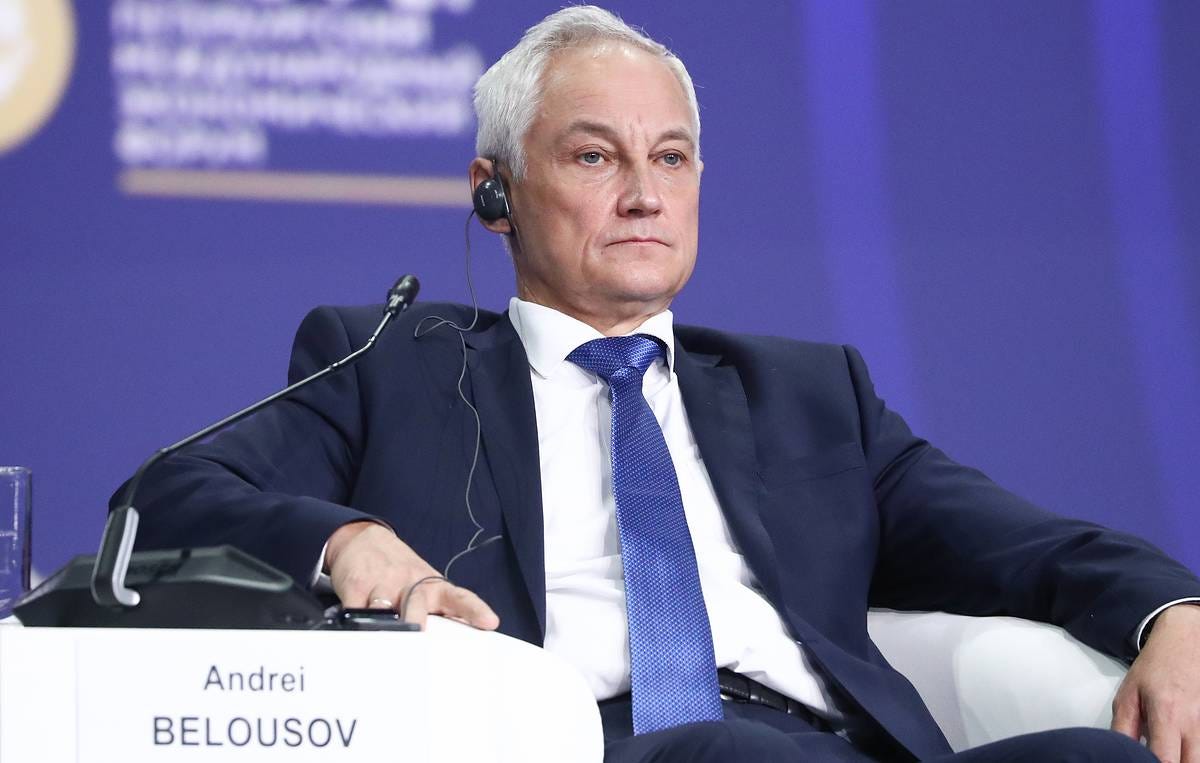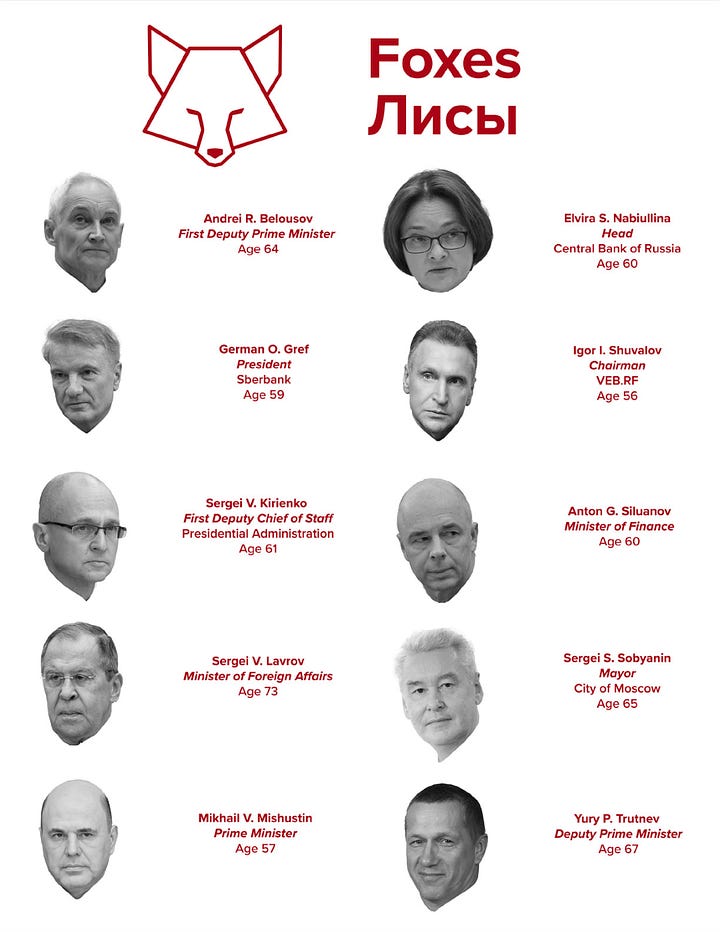
Meet the man whose job it is to make sure Vladimir Putin wins his war.
Andrei Belousov — probably the least liberal of Russia’s talented economic technocrats — is the country’s new Minister of Defense. In that role, he replaces the vaunted Sergei Shoigu, who has been beside Putin for more or less the entirety of his political career, and whose new job as Secretary of the Security Council may or may not prove to be a promotion. (We don’t yet know what job awaits the outgoing Secretary, the equally vaunted and equally close to Putin Nikolai Patrushev, but it’s hard to imagine it won’t be a demotion, if only because there aren’t a lot of good jobs left. Or maybe his booby prize was the promotion of his son, Dmitry, from Minister of Agriculture to Deputy Prime Minister.)
The conventional wisdom — at least as of an hour or two after the news broke, as expressed by the FT — was that Belousov’s role would be to cut down on military profligacy and ensure that the budget could continue to support the war. I’m fairly certain the conventional wisdom is at least a little wide of the mark. Belousov’s appointment is, in part, a recognition of how central the war has become to the economy, and how central the economy is to the war. But it’s also more than that: it’s an attempt to reshape what has become one of the key dividing lines within Putin’s power elite.
Let me start with the second point, because it’s the more important one, I think. In the previous edition of TL;DRussia — and I swear I didn’t plan this! — I wrote about the recent CEPA report focusing on the need for a long-term policy of containment. In that edition, I referred to one strand of the report’s analysis, namely the emergence of two political camps within the Russian elite, which we referred to as ‘Foxes’ and ‘Bears’:
Building on work by Ivan Fomin, we noted that the war has contributed to a restructuring of Russia’s political and economic elite into two broad camps:
The Bears, “who believe that long-term geopolitical confrontation with the West works in their favor”; and
The Foxes, “who believe that they would be better off with a return to something resembling the status quo ante.”
In the report itself, we placed Shoigu firmly among the Bears (along with Patrushev, of course), and Belousov firmly among the Foxes.


It would be a mistake to assume that Belousov’s appointment to replace Shoigu means that the long ascendancy of the Bears is at an end. It does, however, give the Foxes a seat at the table in a way they haven’t had for years. For a long time — at the very least since Russia’s initial invasion of Ukraine in 2014 — Russia’s economic elite have found themselves in an increasingly subservient position. In recent years, their primary role has been to find ever more creative ways of keeping the money flowing to war effort, while maintaining macroeconomic stability and socio-economic quiescence. They have not had any real say in how the money they earn and manage is spent.
Putting Belousov in Shoigu’s chair does not all of a sudden mean that foreign and security policy and the conduct of the war will be shaped by the likes of Finance Minister Anton Siluanov or Central Bank Chair Elvira Nabiullina, or by their friends and colleagues who run the country’s banks, trading houses and many of the other companies that make the Russian economy tick. Belousov — as the Russian economist Konstantin Sonin noted on Twitter shortly after the news broke — has always been something of an awkward fit among his peers.
But it does mean that they’ll have someone they can talk to more readily than they eer could with Shoigu. And it sends a signal to the Foxes that even as Putin doubles down on the war and on long-term geopolitical conflict with the West, they can count on getting more than the (relative) table scraps that have been their fare of late.
This is an important shift, and one I’ll admit I hadn’t quite anticipated. The emergent competition between the Foxes and the Bears had been evident for quite a while, and we knew it posed a challenge to the Kremlin. If the Foxes were to conclude that their positions in the system were not only irrevocably diminished, but doomed to shrink still further, their dissatisfaction could create problems. Similarly, any signal that war and conflict were temporary could upset the Bears. At the end of the day, Putin needs both camps on board if his rule is to be effective. Up until the election, he successfully squared this circle by avoiding the question: at no point during the campaign did he give anyone any vision of the future, allowing both the Foxes and the Bears to believe that the future was still unsettled, and thus they both had something to play for.
I had assumed that the Kremlin would retain this kind of ambiguity even after the election, and, to some extent, it has. Certainly, Putin’s fifth inaugural address included no discernible vision. Perhaps that charade is wearing increasingly thin. Or maybe they just decided they no longer needed the charade at all. Either way, the message sent by Belousov’s appointment is crystal clear: The war is here to stay. And by putting that message in the hands of a Fox, the Kremlin is also attempting to create a community of interest among the Foxes and the Bears. I don’t know whether it will work, but—from Putin’s point of view—it’s a smart idea.
Belousov’s job as Minister of Defense, however, is more than just symbolic. While General Staff Chief Valery Gerasimov continues to run the front, maybe with some involvement from Shoigu, Belousov’s focus will likely be on deepening the integration between the war and the Russian economy. As Aleksandr Kolyandr wrote in The Spectator on Saturday, economic production in Russia is now inextricably linked to the war. Keeping the economy going thus requires that the war machine itself be run by someone who understands the structure of the economy it is feeding.
That, however, is only part of the task. As important as the war is to the economy, the economy is also central to the war and to the Kremlin’s ability to prosecute it. It’s not just a question of producing guns, missiles and tanks. For Russia, sustaining the war economy requires making sure that there is enough labor for the factories and enough men on the front line, keeping wages and prices in check, stretching oil income, substituting for lost imports, and maintaining liquidity amid rising costs of capital both at home and abroad. Shoigu’s eyes would have likely glazed over halfway through that sentence; Belousov’s would have lit up.
Belousov will likely have one more equation to solve: call it the Prigozhin problem. As I wrote back in January 2023 (presciently, as it turned out), six months or so before Prigozhin’s putsch:
Among the military, paramilitary and pseudomilitary brass, Putin’s not concerned so much about defection, as about competition. Prigozhin may or may not be concerned about winning victories on the battlefield. He is certainly, however, concerned about getting credit for those victories, because that credit underpins the flow of money his way, both from the state, and from those who may want to curry favor. In other words, the war is succumbing to the same rent-seeking logic that has governed most of the rest of the Russian political economy since the end of the Soviet Union. That’s certainly a game Putin knows how to play, but the confluence of a rent war and a shooting war is potentially fraught.
There is no indication that Prigozhin’s demise has brought an end to rent-seeking in and around the war, or in the military-industrial complex more broadly. If anything, it’s quite the opposite. The war and its attendant appropriations are, in a manner of speaking, Russia’s new oil (though the war itself remains highly dependent on flows of the old kind of oil). Replacing Shoigu with Belousov is unlikely to lead to any significant reduction in war-related graft and corruption—and Putin probably knows that. Rather, Belousov’s task will likely be to ensure a more even and sustainable distribution of the proceeds of said graft and corruption, such that too much of it does not settle in the pockets of a single person or group of people. This may well turn out to be Belousov’s most difficult task, all but guaranteeing that he will make at least as many enemies as friends. As Sonin pointed out, however, Belousov may in fact feel more comfortable that way.
What I’m reading
Right up until the Belousov-Shoigu maneuver, I wasn’t planning on bringing the naming of Russia’s next council of ministers into this roundup. It was mostly very boring: Mikhail Mishustin returned as Prime Minister and promptly renominated the vast majority of his previous government. Belousov’s departure—with his destination not at the time announced—was probably the biggest surprise, followed by ministerial appointments for four regional governors. The promotion of Patrushev’s son, alas, surprised no one.
That said, my eye had been caught earlier in the week by a report by Meduza’s Andrei Pertsev back on 6 May suggesting that ministers and other high-level officials were, in fact, itching for a shakeup. It’s not just that Pertsev called Shoigu’s departure. The article provided an interesting window into mindsets at or near the top of the system, with some players jockeying for position in what they believe may be Putin’s final term, and others just hoping for something to punctuate the stagnation.
I’m tempted to read that piece in tandem with two others — a TV Rain report from two weeks ago on the struggles of “war heroes” to use their service as a leg up in Russian politics, and another Andrei Pertsev article in Meduza on 1 May on the poor staying power of Russian officials who take up posts in occupied Ukrainian territory. Both of these suggest that Putin’s promise of a new elite based in service in the war is (surprise, surprise) failing to live up to his hype. And if that’s true, then finding a way to accommodate the existing elite in existing structures is going to be ever more important.
On another related note, it’s very much worth taking a look at Andrei Yakovlev’s analysis of business sentiment in wartime Russia, which he published in iStories on 22 April. Among other things, the piece illustrates the degree of support provided by the Russian government to the economy, particularly in the early phases of the war. Much of that, of course, would have been done under Belousov’s supervision. We might thus expect those instincts to carry over into his new job.
Elsewhere:
Kirill Rogov revisits the question of Putin’s “legitimacy” and particularly at the idea that there was ever a “social contract” between Putin and the people, in which the people agreed to surrender their political franchise in return for socio-economic benefits. Anyone who has read either of my books will know how much I dislike this allegedly uncontroversial idea.
In a policy brief for the Centre for European Reform, Ian Bond cogently re-summarizes the reasons why helping Ukraine win the war is in the national interest of most, if not all, states of the West—and then enumerates all the ways in which Western governments are ceding ground to Moscow.
Max Seddon, Christopher Miller and John Paul Rathbone had an excellent report in the Financial Times towards the end of April on the fact that—despite its ability to throw its economy onto a war footing—Russia is very much coming up against the limitations of its ability to prosecute this war. That, in turn, should refocus attention on the arguments in Ian’s policy brief, above.



